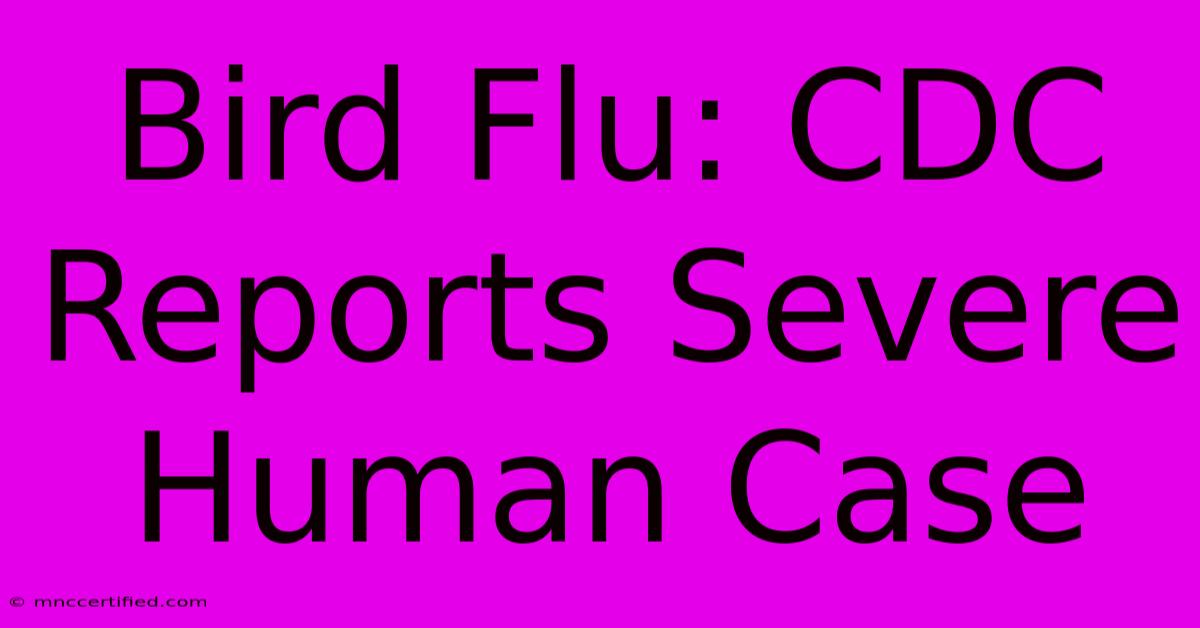Bird Flu: CDC Reports Severe Human Case

Table of Contents
Bird Flu: CDC Reports Severe Human Case - What You Need to Know
The Centers for Disease Control and Prevention (CDC) recently reported a severe human case of avian influenza, also known as bird flu. This alarming development underscores the importance of understanding the virus, its transmission, and the necessary precautions to protect yourself and your community. This article will delve into the specifics of this recent report, explore the symptoms, preventative measures, and address common concerns surrounding avian influenza.
Understanding Avian Influenza (Bird Flu)
Avian influenza is a viral infection that primarily affects birds. Several subtypes of the virus exist, with some posing a greater risk to humans than others. H5N1 is a highly pathogenic strain that has been responsible for several human infections, often resulting in severe illness. While bird-to-human transmission is relatively rare, it's crucial to be aware of the potential risks. The recent CDC report highlights the severity of such infections and the unpredictable nature of the virus.
How Bird Flu Spreads
The primary mode of transmission for avian influenza is through direct contact with infected birds or contaminated surfaces. This includes touching infected bird droppings, feathers, or respiratory secretions. Indirect transmission is also possible, through contaminated environments or the consumption of undercooked poultry products.
Human-to-human transmission is rare, but the possibility cannot be entirely ruled out, especially with highly pathogenic strains. The CDC closely monitors any instances of potential human-to-human spread. The recent severe case reported by the CDC warrants increased vigilance and reinforces the need for proactive preventative measures.
Symptoms of Avian Influenza in Humans
Symptoms of avian influenza in humans can vary but often include:
- Fever and chills: High fever is a common initial symptom.
- Cough and sore throat: Respiratory symptoms are frequently reported.
- Muscle aches and fatigue: Severe body aches and exhaustion are characteristic.
- Headache: Intense headaches can also occur.
- Diarrhea and vomiting: Gastrointestinal symptoms may be present.
Severe cases can lead to pneumonia, acute respiratory distress syndrome (ARDS), and even death. The recent CDC report emphasized the severity of the reported case, highlighting the potential for fatal outcomes. If you suspect you may have contracted avian influenza, seek immediate medical attention. Early diagnosis and treatment are crucial in improving outcomes.
Protecting Yourself from Bird Flu
Protecting yourself from avian influenza involves several key strategies:
- Avoid contact with birds: This is especially important with wild birds, particularly those appearing sick or dead.
- Practice proper hand hygiene: Wash your hands frequently with soap and water, especially after handling poultry or being in contact with birds.
- Cook poultry thoroughly: Ensure poultry is cooked to an internal temperature of 165°F (74°C) to kill any potential viruses.
- Avoid contact with surfaces contaminated with bird droppings: Wear appropriate protective gear if cleaning areas with potential contamination.
- Stay updated on CDC recommendations: Regularly check the CDC website and follow their recommendations for prevention and control.
The Importance of Public Health Surveillance
The CDC's reporting of this severe avian influenza case underscores the critical role of robust public health surveillance. Early detection and rapid response are vital in preventing widespread outbreaks. Continued monitoring, research, and collaboration between health organizations are crucial in mitigating the risk of future infections. By staying informed and taking preventative measures, we can collectively minimize the impact of this potentially deadly virus.
Frequently Asked Questions (FAQs)
Q: Is bird flu easily spread between humans? A: Human-to-human transmission is rare but possible, particularly with highly pathogenic strains.
Q: What should I do if I find a dead bird? A: Avoid contact and report it to your local animal control or health department.
Q: Are there vaccines available for avian influenza? A: Vaccines exist, but their availability and use depend on the specific strain and epidemiological context.
This article is for informational purposes only and does not constitute medical advice. Always consult with a qualified healthcare professional for any health concerns. The information provided here is based on currently available data and understanding of avian influenza, which is subject to change. Regularly consult reputable sources, such as the CDC, for the latest updates.

Thank you for visiting our website wich cover about Bird Flu: CDC Reports Severe Human Case. We hope the information provided has been useful to you. Feel free to contact us if you have any questions or need further assistance. See you next time and dont miss to bookmark.
Featured Posts
-
Newsom Strengthens Californias State
Dec 19, 2024
-
Channel 4 Popular Shows Departure After 20 Years
Dec 19, 2024
-
Homes Without Water After System Failure
Dec 19, 2024
-
Fatal Kamaka Air Crash Near Honolulu
Dec 19, 2024
-
Wallace Out Dent In Celebrity Show
Dec 19, 2024